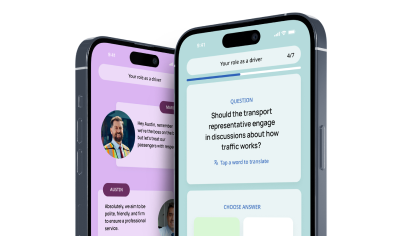15 best LMS for small businesses in 2024: a well-researched roundup
Now that we understand the value of learning management software for small business and the key factors to consider when choosing one, let’s explore the top options that stand out in 2024. We’ll break down their key features, pricing models, and why they might be the perfect fit for your company. Let’s dive in and take a look at each option one by one.
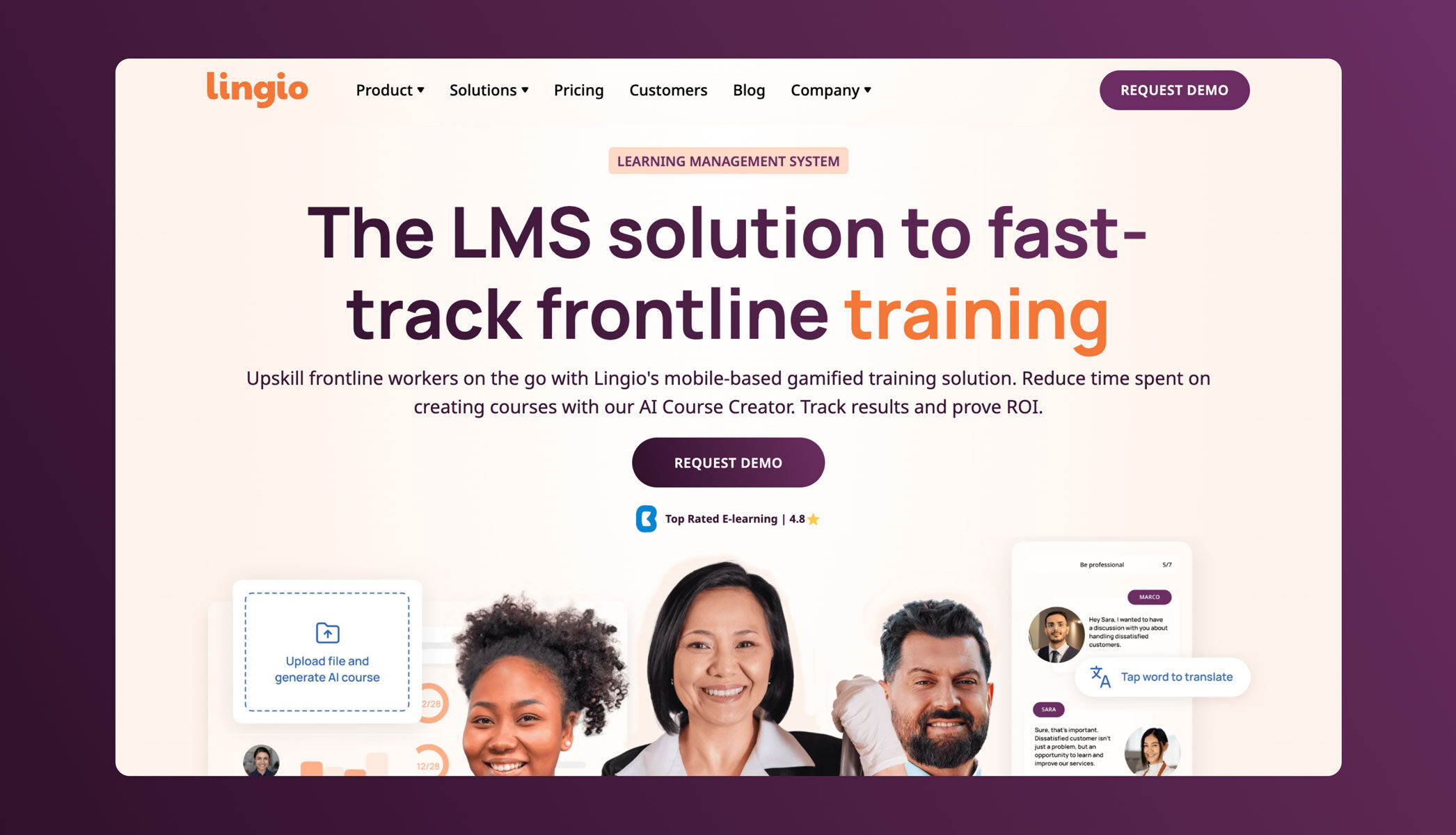
Lingio is an AI-first LMS designed for businesses in frontline sectors such as cleaning, elderly care, hospitality, transportation, and facility management. It offers immense value for small businesses with frontline workforces by providing a quick and effective way to train and upskill employees on the go. With its focus on gamified learning and AI-driven course creation, Lingio LMS streamlines training processes while ensuring employees stay engaged and learning outcomes are measurable.
Key capabilities include:
- Mobile-based, gamified learning: Train your workforce directly on their mobile phones with interactive, short courses that keep staff engaged. The mobile learning app ensures training fits seamlessly into busy schedules, eliminating the hassle of in-person sessions.
- AI-powered course creation: Lingio’s AI course creator tool lets you turn your existing training materials into engaging, interactive courses within seconds. Customise the content or use editable templates to save time while providing your team with relevant, tailored training experiences.
- Effortless progress tracking and ROI: TheTracking and Coaching Portal provides a clear overview of each employee's progress and results. Automated reminders help you effortlessly reach your learning goals while tracking training's impact on performance and ROI.
- Inclusive learning environment: With language support and accessibility features, Lingio caters to diverse learning needs. This creates a more inclusive workplace where every team member can upskill.
- Easy course distribution: Share courses through a simple SMS link, ensuring employees can access training with just a few taps. This streamlined distribution method makes onboarding and ongoing training efficient, minimising disruption to daily operations.
Testimonial from an employee at L&T, small commercial cleaning business in Sweden:
“I trained using Lingio every morning in the car, every break at work, and at home in the evenings. I answered the course questions, sometimes in my head and sometimes I wrote the words.”
Hassan Omar Hussein, Commercial Cleaner at L&T.
Pricing:
- A feature-rich freemium version is available to try out. For details on the paid plans, please request a demo.
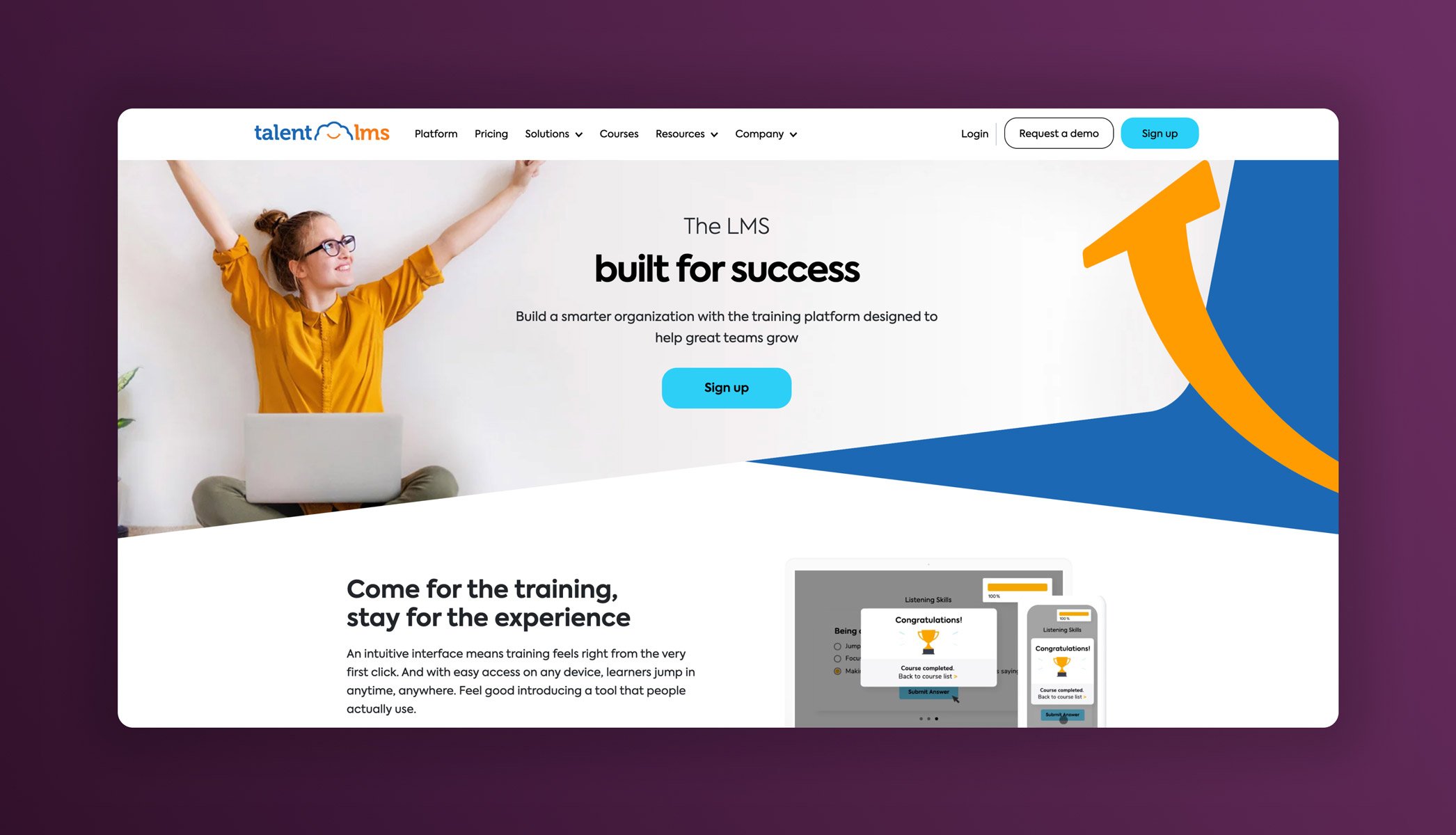
TalentLMS is a cloud-based learning management system known for its simplicity, scalability, and adaptability. Ranking among the top LMS providers in the UK, it is trusted by over 70,000 teams worldwide. It caters to businesses of all sizes, particularly small companies looking for a cost-effective way to streamline their training processes. Recognised names like Google, Amazon, Meta, and Unilever have efficiently used TalentLMS to meet various training needs.
Key capabilities include:
- Fast implementation: The platform is designed for quick setup, allowing small businesses to create and launch courses from day one without dealing with complex configurations or delays.
- Automated training management: Supports repetitive task automation, helping streamline the learning process for administrators and learners. This reduces manual work, making tracking progress and supporting learning goals easier.
- Mobile accessibility: Provides native apps for iOS and Android, enabling employees to access training materials anytime and anywhere.
Ratings:
Pricing:
- Freemium version is available for up to 5 users and 10 courses.
- Paid subscription plans start from $69/month (£51/month) when billed annually.
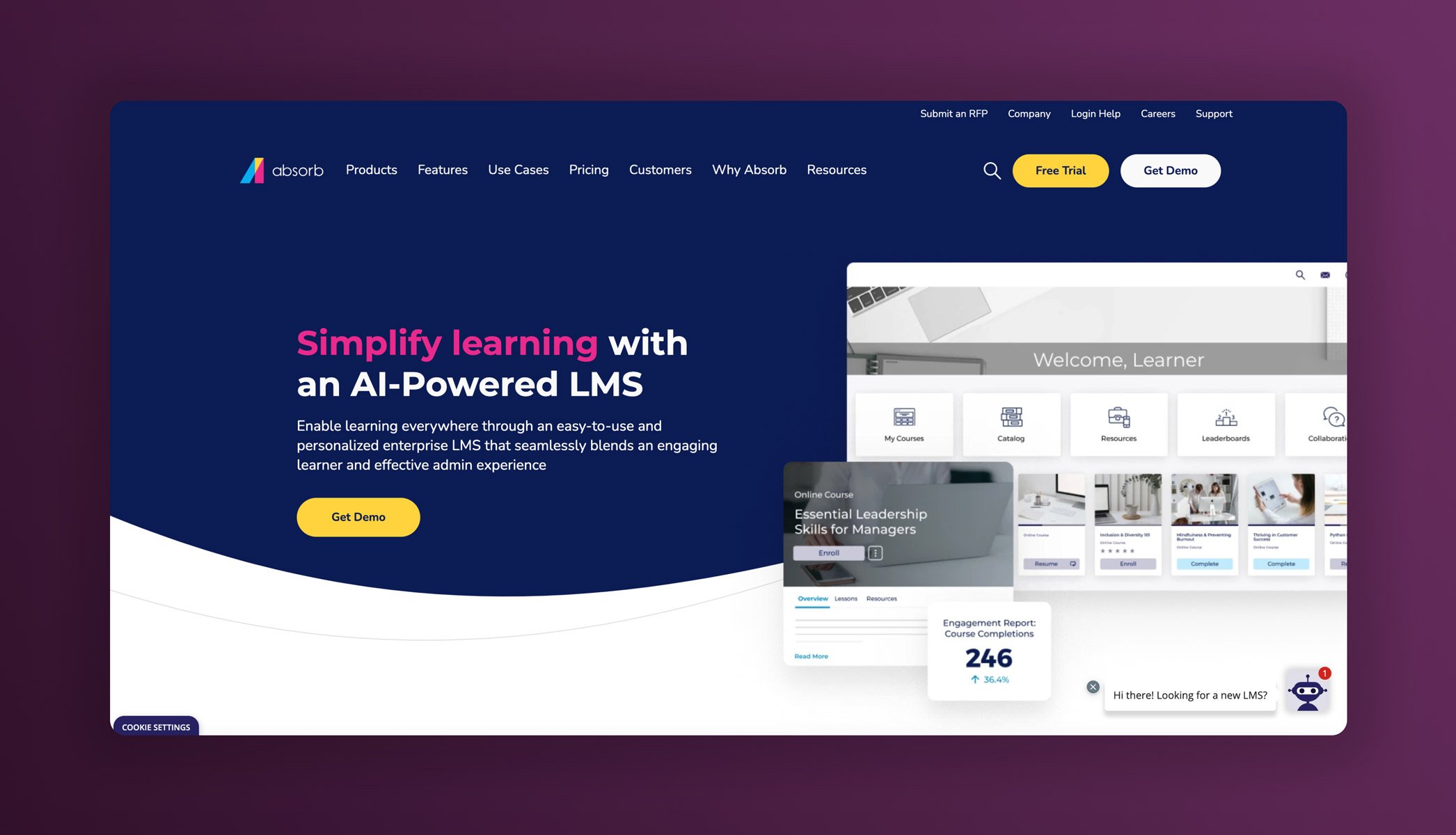
Absorb LMS is an AI-powered learning management system designed for versatile training across various industries. With over 1,700 global clients, it supports a wide range of use cases, including employee onboarding, compliance training, customer education, and sales training.
Key capabilities include:
- Skill verification through checklists: Offers observation checklists to bridge the gap between online training programs and on-the-job training. This feature allows supervisors, peers, or third-party reviewers to verify employees' skills, ensuring training compliance and tracking progress automatically.
- Direct learning paths: Uses AI-driven tools like Absorb Pinpoint to connect learners with the exact information they need, even in the middle of video lessons. This ensures that training is quick and focused, enhancing retention and engagement.
- Integrated e-signatures for compliance: Enables learners to electronically sign off on completed training, confirming that they have met important compliance requirements. This simplifies tracking and ensures legal diligence, all within the LMS.
Ratings:
Pricing:
- Pricing information is available on request.
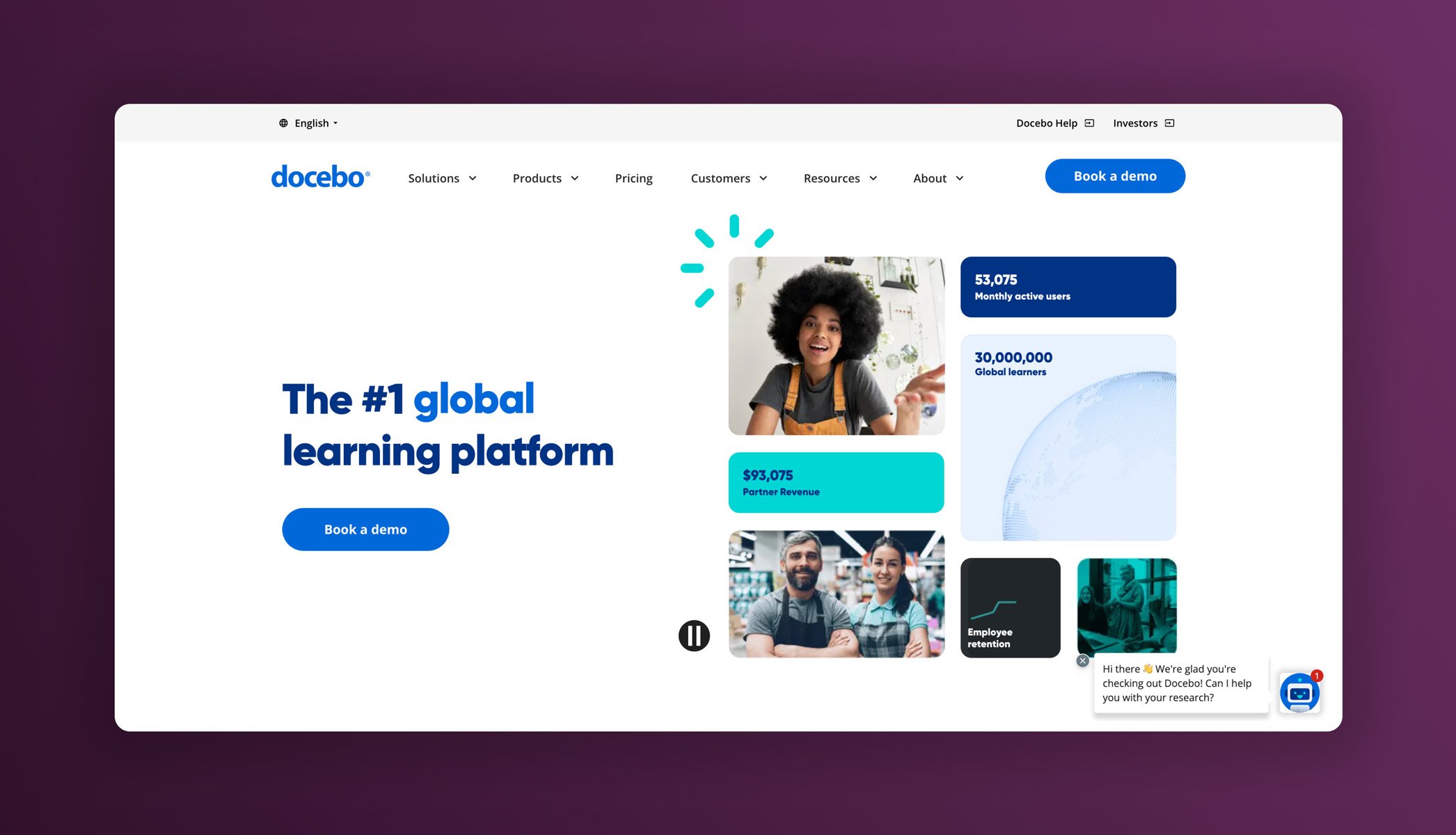
Docebo is a comprehensive learning platform founded in 2005 in Italy, now serving a global audience with offices in the US, UK, Canada, France, Dubai, and Italy. It targets enterprises looking for scalable and hyper-personalised learning experiences across various use cases. For example, employee onboarding, talent development, sales enablement, and customer education.
Key capabilities include:
- AI-powered content creation: Uses AI to quickly generate engaging learning materials, saving time and effort in content creation while optimising for better retention and skill-building.
- E-commerce capabilities: Offers flexible options for monetising courses, allowing companies to sell training materials individually or through subscriptions. Supports multiple currencies and promotional tools to maximise revenue.
- Seamless integrations: Connects effortlessly with existing tech ecosystems, improving the learning experience and streamlining administrative tasks.
Ratings:
Pricing:
- Pricing information is available on request
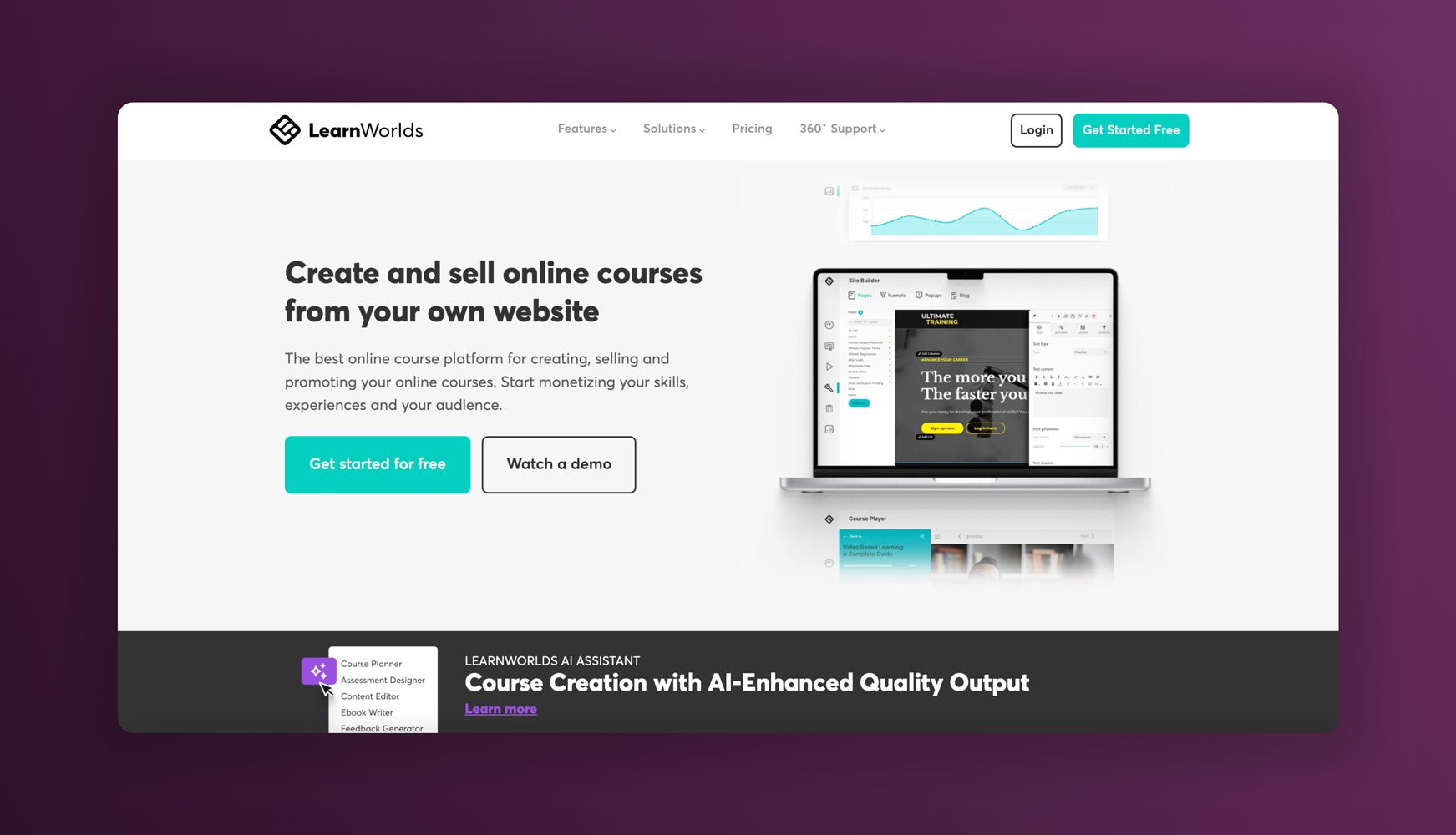
LearnWorlds is an AI-powered LMS designed for course creators, entrepreneurs, and businesses looking to create, sell, and promote online courses. Established in 2014, it now serves over 10,000 customers globally. The platform is known for its flexibility in building engaging training experiences, making it a popular choice for those aiming to monetise their skills and expertise through a branded online academy.
Key capabilities include:
- Custom-branded online academies: Offers white-label functionality, enabling users to fully customise their academy with branding, themes, and domain integration. This feature helps businesses maintain control over the user experience and project a professional image.
- Built-in e-commerce features: Allows selling courses, bundles, and memberships through advanced pricing options. The platform supports global payment gateways, letting you monetise your expertise and scale your offerings.
Ratings:
Pricing:
- A 30-day free trial plan is available. No credit card is required.
- Paid subscription plans start from $24/month (£18/month) when billed annually. A $5 (£3,7) fee per course sale is charged separately.
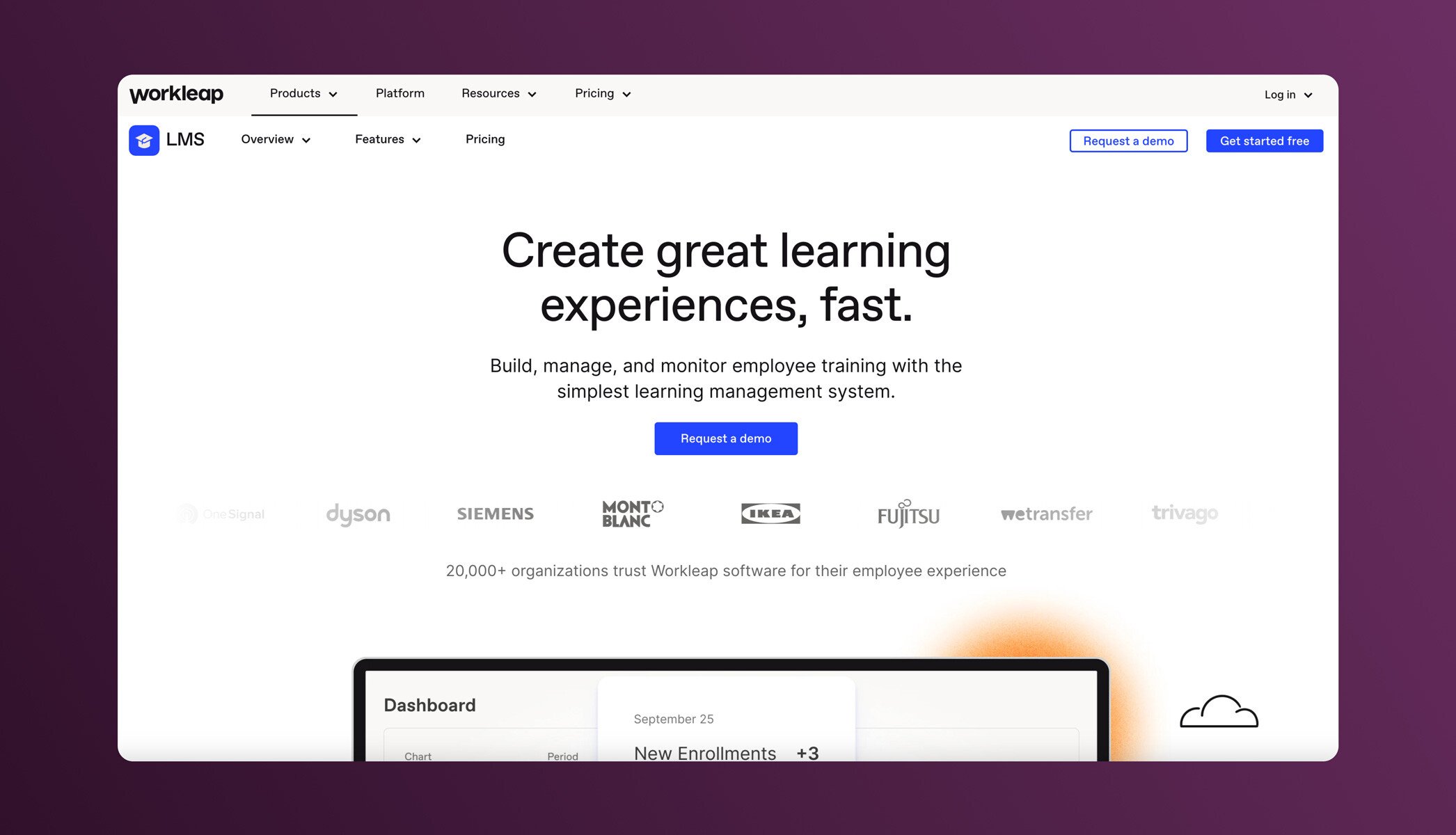
Workleap LMS is a learning management system designed to maximise knowledge sharing within organisations. It caters to over 20,000 global clients, providing an easy-to-use platform for businesses of all sizes to build, manage, and monitor employee training.
Key capabilities include:
- Evaluation and certification: Includes built-in tools for assessing employee skills and validating compliance with just a few clicks, ensuring your workforce can perform safely and efficiently.
- Automated training processes: Supports automating repetitive administrative tasks, making training easier to manage and allowing employees to learn at their own pace.
Ratings:
Pricing:
- A 14-day free trial plan is available.
- Paid pricing information is available on request.
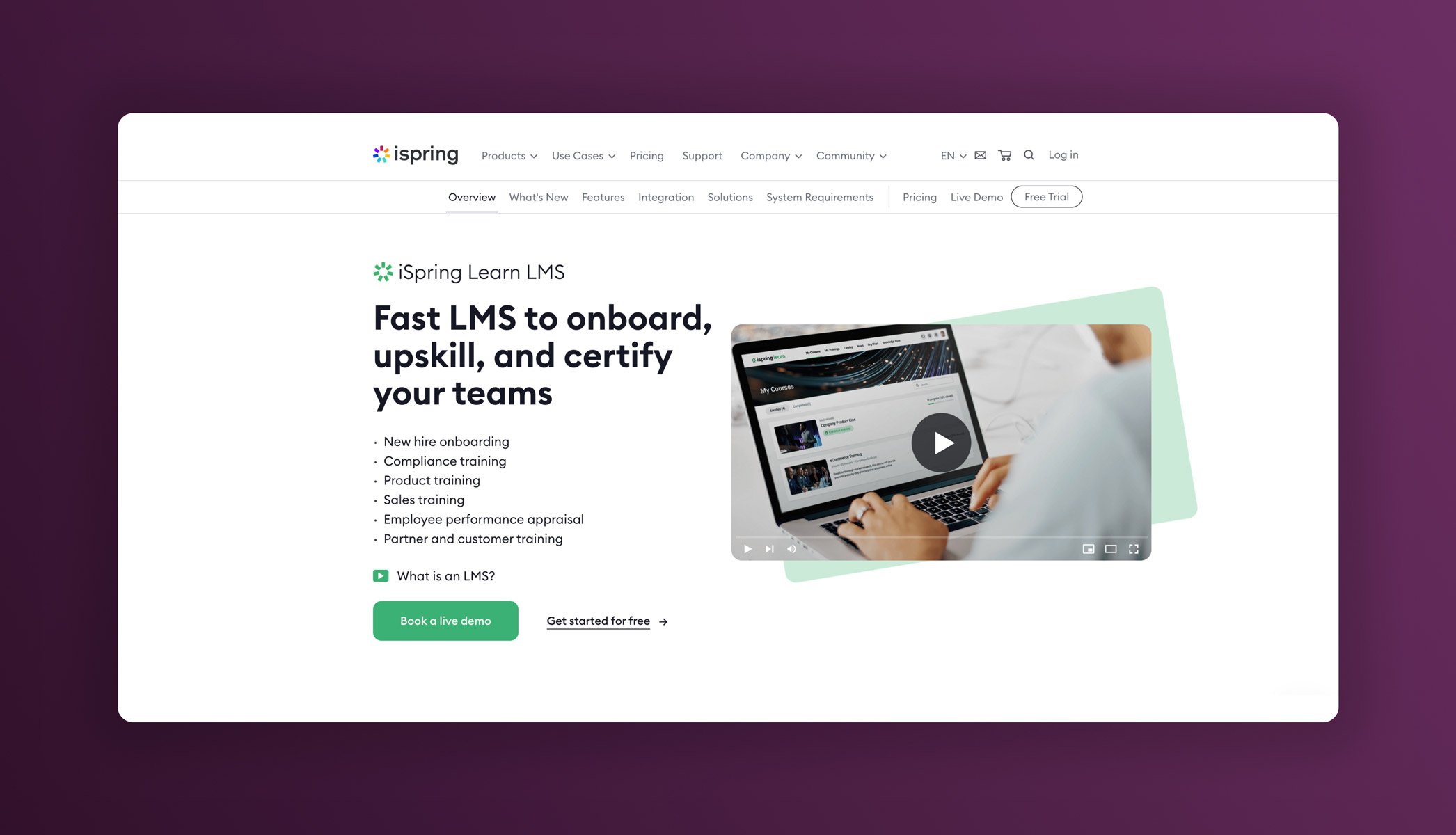
iSpring Learn is a cloud-based learning management system for small companies developed by iSpring Solutions, which is known for its award-winning e-learning software. Designed to facilitate employee onboarding, upskilling, and certification, iSpring Learn is trusted by over 59,000 customers across 170 countries.
Key capabilities include:
- Customised organisational structure: Allows administrators to mirror their company’s structure within the platform, making it easier to assign, manage, and track training for specific teams or departments.
- Brand customisation: Provides white-label options for the LMS and mobile app, allowing companies to incorporate their branding and create a consistent learning environment.
- 360-degree feedback evaluation: Gathers feedback from managers, peers, and subordinates to provide a complete view of each employee's strengths and areas for improvement.
Ratings:
Pricing:
- A 30-day free trial plan is available. No credit card is required.
- Paid subscription plans start from $2.99/user/month (£2.23/user/month) when billed annually.
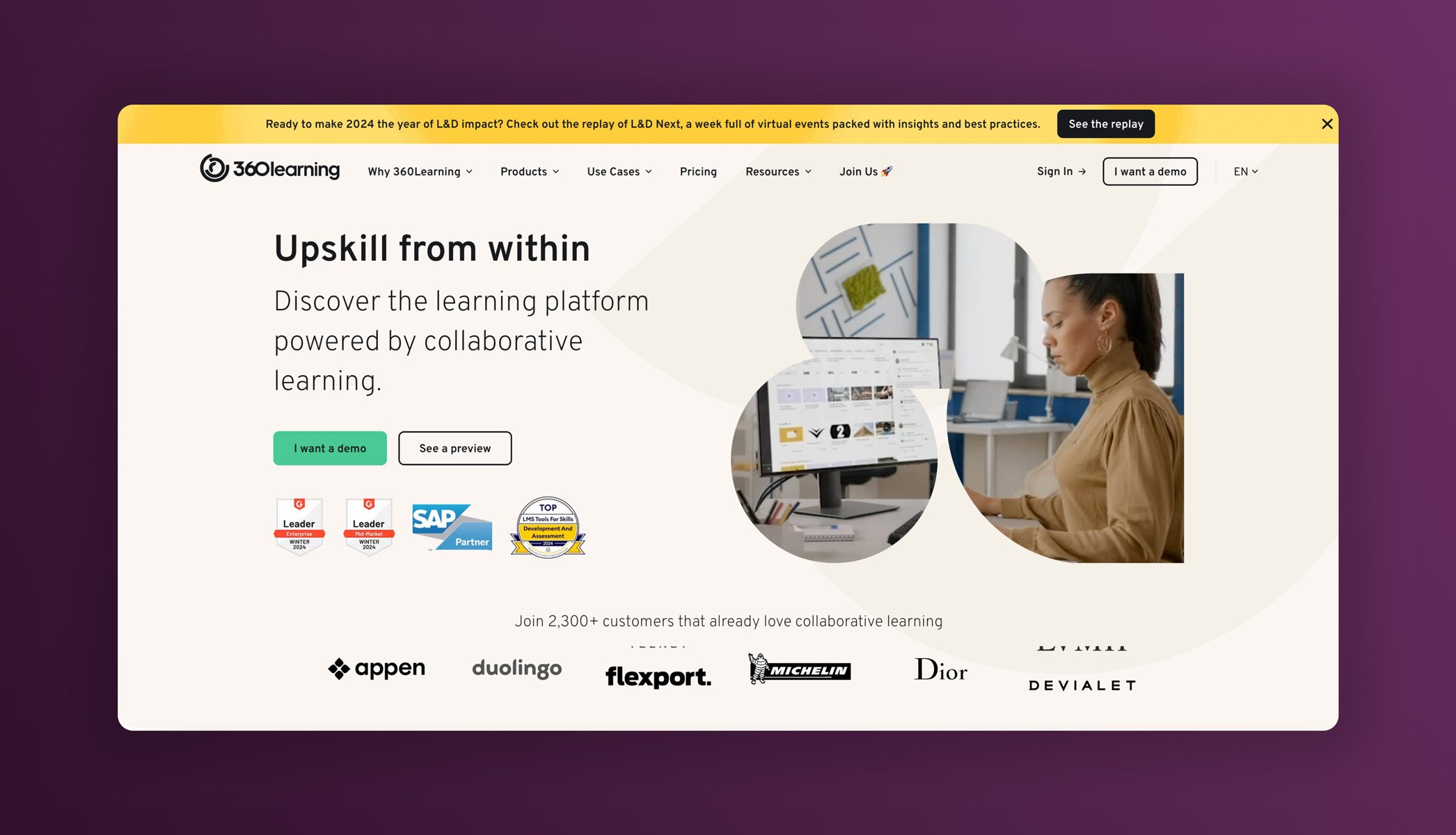
360Learning is known for its collaborative learning platform, which focuses on upskilling teams from within an organisation. It enables businesses to efficiently create, manage, and deliver training content, transforming in-house experts into collaborative learning contributors. With AI and a suite of integrations, 360Learning is designed for various use cases, including compliance training, onboarding, sales enablement, and frontline staff training.
Key capabilities include:
- Robust integrations: Connects with existing business systems like HR platforms, Salesforce, MS Teams, and Zoom to centralise learning data and enable seamless access to training.
- User management flexibility: Provides dynamic tools to manage users, assign permissions, and create nested learner groups, catering to diverse training needs across multiple departments.
- Collaborative course creation: Facilitates course development by allowing any team member to create and share content, reducing traditional course creation times from months to minutes.
Ratings:
Pricing:
- A 30-day free trial plan is available.
- Paid subscription plans start from $8/user/month (£6/user/month)
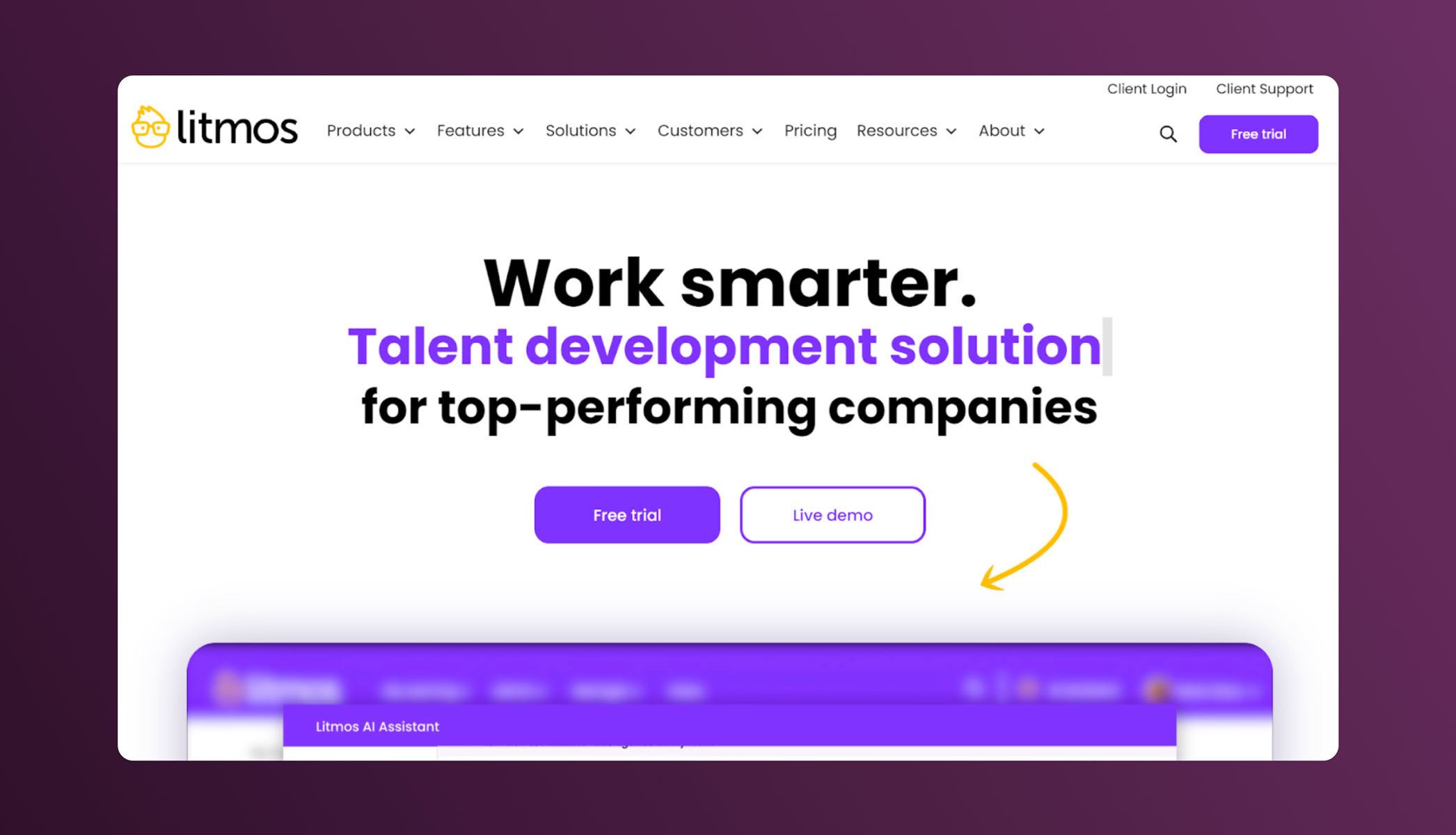
Litmos is an enterprise-focused learning management system designed to streamline training across organisations. Established in 2007, it serves over 4,000 companies, including notable names like YouTube and IBM. While it caters to larger enterprises, small businesses with complex training needs may also find value in its extensive features and integrations.
Key capabilities include:
- Quick deployment and integrations: Allows for rapid implementation, integrating seamlessly with existing systems like Salesforce, MS Teams, and other workflow tools to enhance efficiency.
- Robust reporting and analytics: Provides built-in reports to measure key metrics like course completions and assessment scores, helping optimise training strategies and demonstrate ROI.
Ratings:
Pricing:
- A 14-day free trial plan is available. No credit card is required.
- Paid pricing information is available on request.
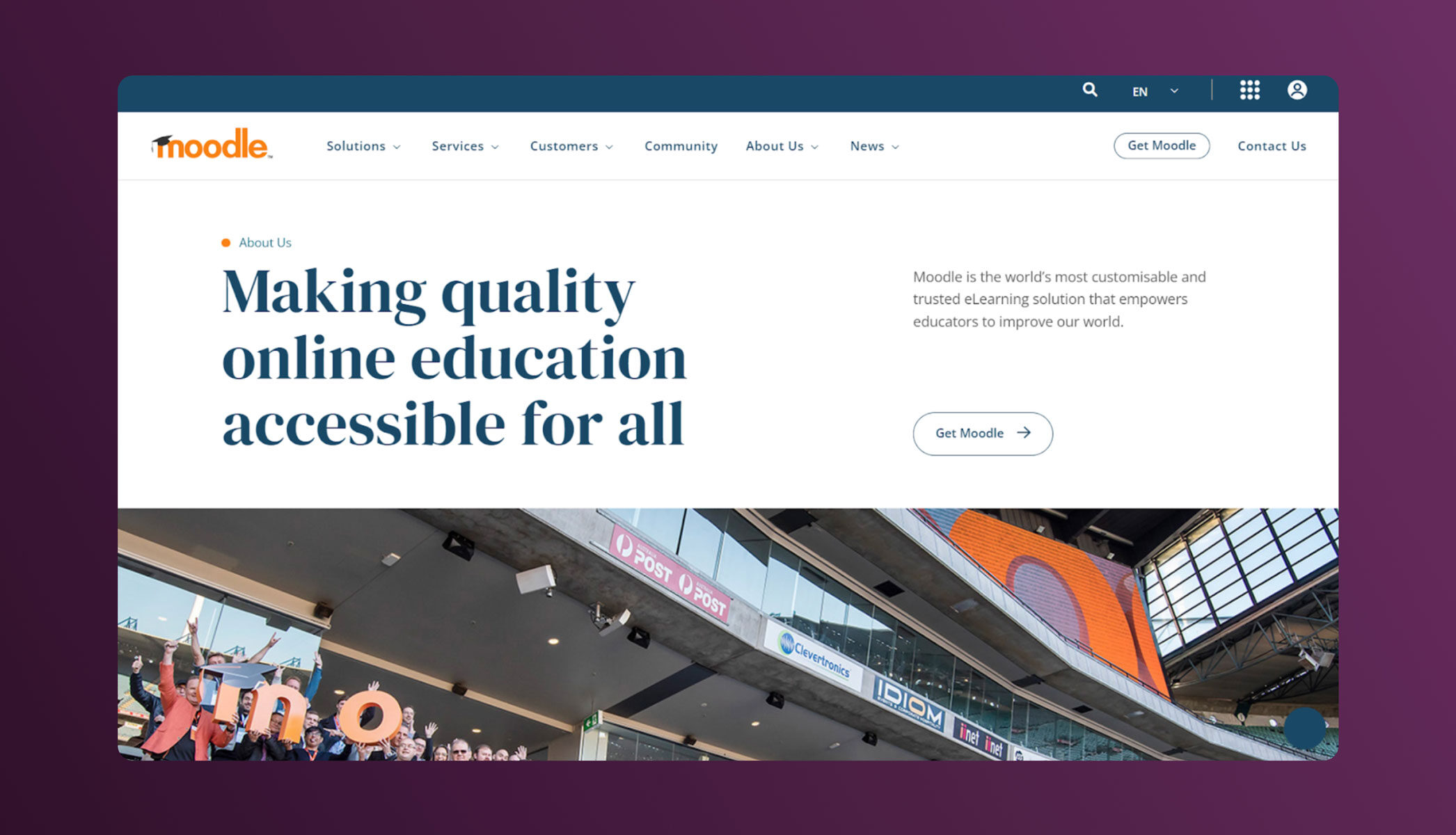
Moodle is a widely recognised open-source learning management system known for its flexibility, scalability, and extensive features. With over 20 years in the market, it supports various teaching and training methods, making it suitable for educational institutions, vocational training, and corporate use.
Key capabilities include:
- Customisable learning experiences: Offers a range of activity formats and learning paths to match different learning styles, enabling organisations to design courses tailored to their unique audience.
- Seamless integrations: Connects easily with various tools, including video conferencing, student information systems, and plagiarism detection services, expanding its functionality to meet specific needs.
- Accessible learning: Features an inclusive platform interface with integrated accessibility checkers and text-to-speech tools, making learning more accessible for all users.
Ratings:
Pricing:
- Available for free as an open-source download without the need to pay any licensing fees.
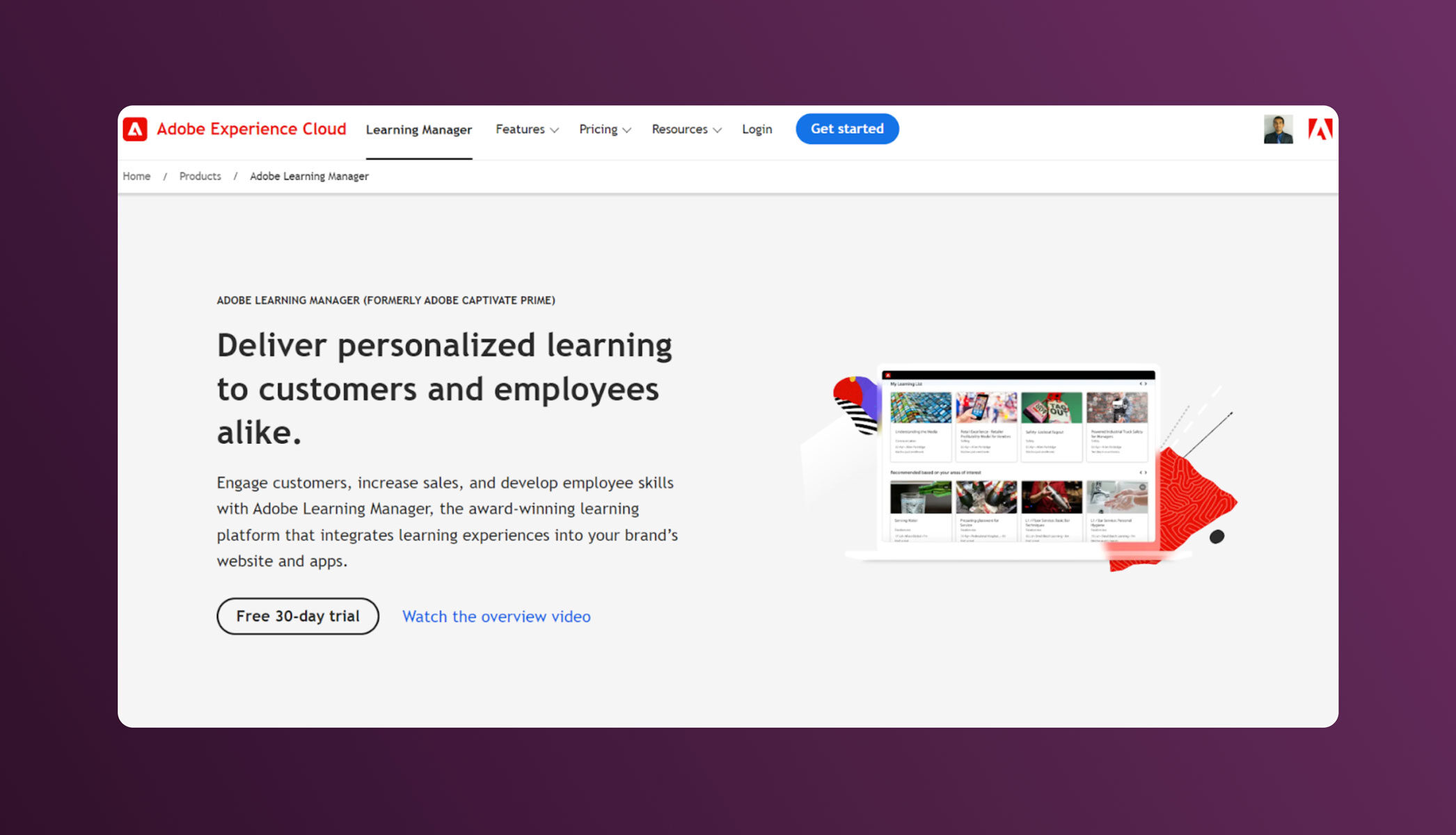
Adobe Learning Manager (formerly Adobe Captivate Prime) is a cloud-based LMS designed for mid to large enterprises, offering personalised learning at scale for partners, customers, and employees. Widely adopted by Fortune 500 companies and mid-sized enterprises, it caters to various industries with its comprehensive suite of training features.
Key capabilities include:
- Personalised learning paths: Utilises AI and machine learning to tailor learning journeys, offering relevant course recommendations to keep learners engaged and motivated.
- Unified learning experience: Supports hybrid learning by offering a single dashboard view of all available content, simplifying access for users.
- Extensive content library: Features over 86,000 courses in its content marketplace, enabling a wide range of training options for diverse learning needs.
Ratings:
Pricing:
- A 30-day free trial is available.
- Paid pricing information is available on request.
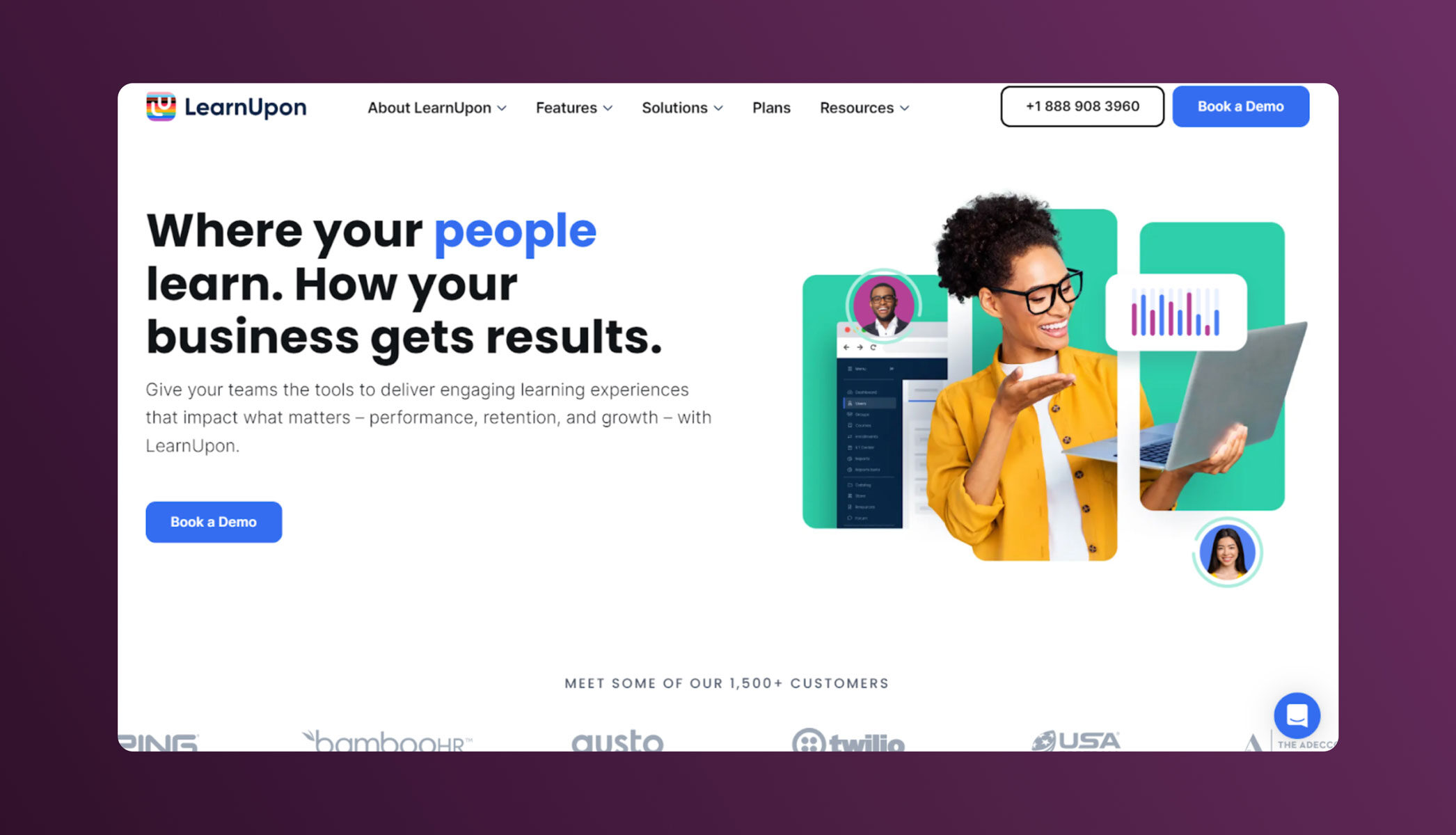
LearnUpon is a user-focused LMS trusted by over 1,500 businesses, ranging from Fortune 100 companies to small and medium-sized businesses (SMBs). It is designed to centralise training management, streamline learning, and deliver impactful training for employees, partners, and customers.
Key capabilities include:
- Multi-audience support: Accommodates training for various groups, including employees, customers, partners, and members, within a single platform.
- Automated certification and credits: Automatically issues personalised completion certificates and tracks internal and external learning credits, ensuring a cohesive learning experience.
- Global accessibility: Offers a multilingual interface supporting over 20 languages, enabling effective training for a diverse, global audience.
Rating:
Pricing:
- Pricing information is available on request.
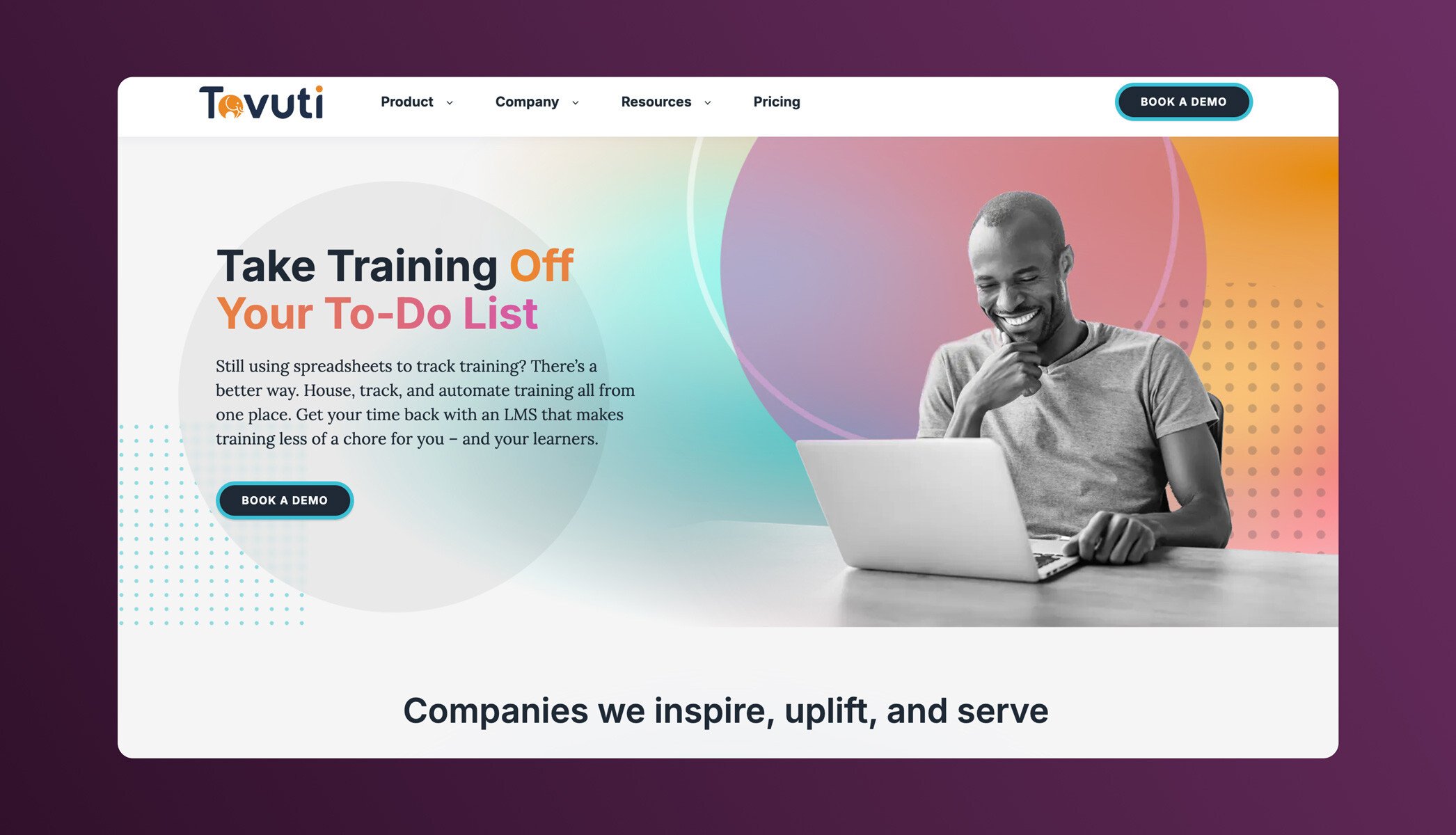
Tovuti LMS is a versatile learning management system designed to streamline content creation, engage learners, and manage training for businesses of all sizes. Known for its fast implementation and ease of use, it serves a diverse clientele, including small businesses and larger enterprises.
Key capabilities include:
- Scalable for small businesses: Easily scales to meet the changing needs of small businesses, allowing for automated enrollments, multi-audience support, and the addition of new learners.
- Comprehensive integrations: Features 2,000+ API integrations, connecting with leading platforms like Salesforce and BambooHR to streamline training delivery.
- Tailored learning paths: Supports personalised learning experiences by enabling custom learning paths based on job roles, locations, or compliance requirements.
Ratings:
Pricing:
- Pricing information is available on request.
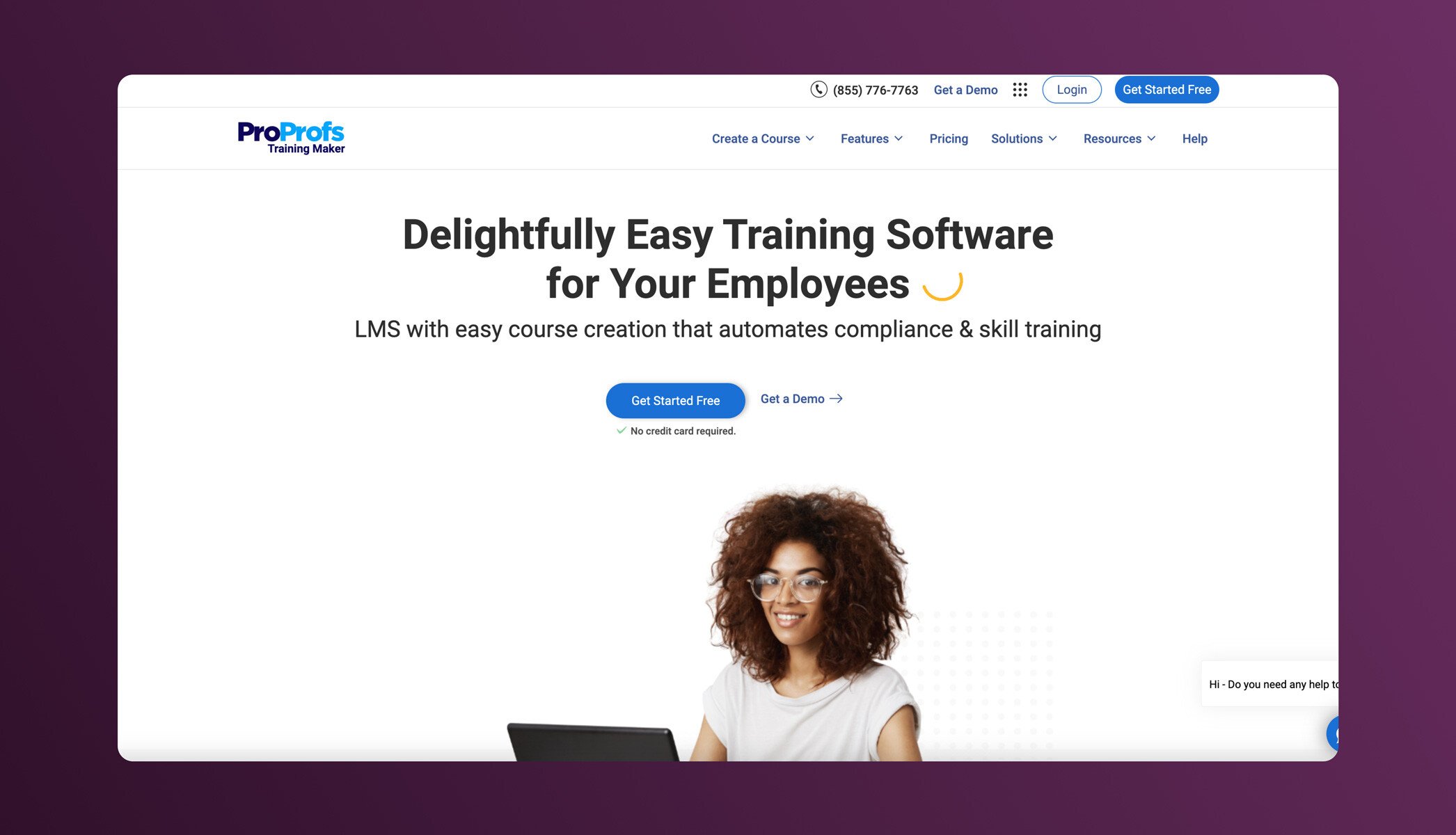
ProProfs Training Maker is an easy-to-use training software that simplifies employee training, compliance, and skill development. With various solutions for businesses of all sizes, it provides flexible, user-friendly tools for creating courses, tracking progress, and enhancing knowledge.
Key capabilities include:
- Virtual classroom management: Centrally administer learners and courses, track progress, and provide announcements through a virtual classroom interface.
- White-label branding: Allows organisations to customise the LMS with their branding, including logos, colour schemes, and personalised certificates.
- Automated assessments: Supports quizzes and surveys to test knowledge retention and collect feedback on training impact.
Ratings:
Pricing:
- A freemium version is available for up to 10 learners.
- Paid subscription plans start from $1.97/active learner/month (£1.47/active learner/month) when billed annually.
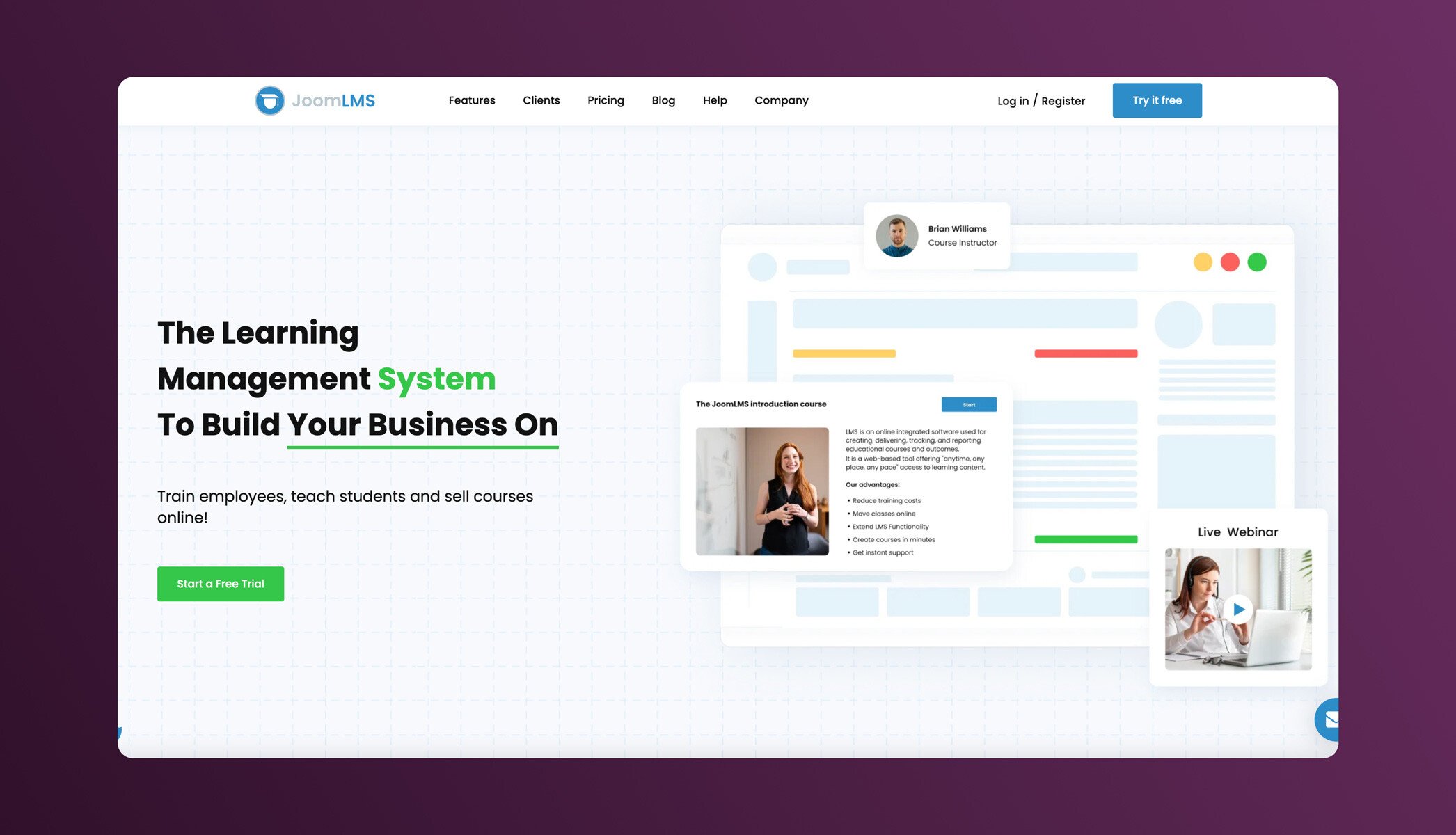
JoomlaLMS is a versatile learning management system designed for a range of use cases, including corporate training, selling courses, and startup education.
Key capabilities include:
- Live and video conferencing: Enables scheduling and conducting live training sessions or webinars directly within the platform, facilitating blended learning experiences.
- Advanced e-commerce integration: Offers tools for selling courses, generating invoices, and creating discounts, allowing users to monetise their content effectively.
- SCORM and AICC compatibility: Supports importing and exporting e-learning materials in standard formats, streamlining content creation and delivery.
Ratings:
Pricing:
- A 30-day free trial plan is available.
- Paid subscription plans start at an annual fee of $399 (£298) for 100 users.

















